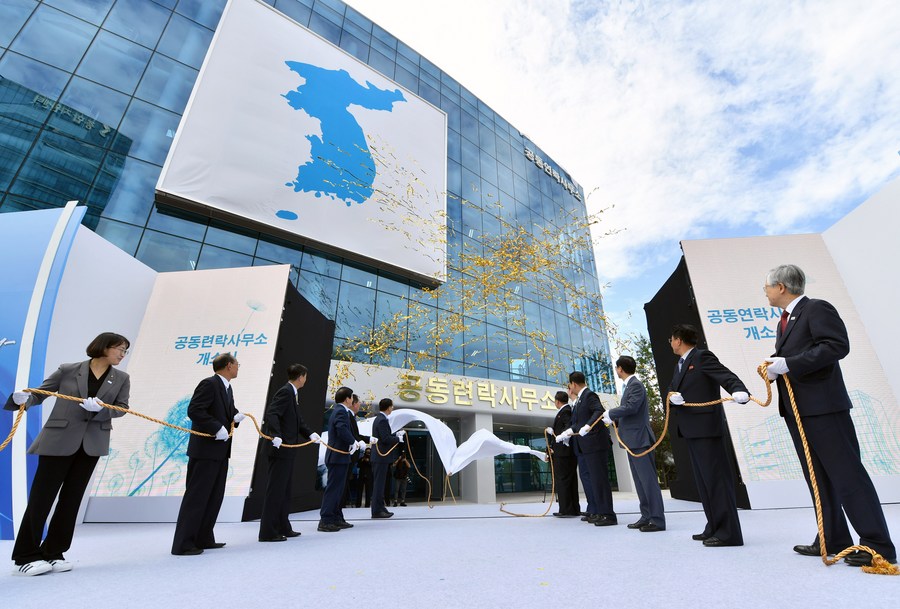
Top leader of the Democratic People's Republic of Korea (DPRK) Kim Jong Un (R) and U.S. President Donald Trump take a walk during their summit meeting in Singapore on June 12, 2018. (Xinhua/Ministry of Communication and Information of Singapore)
All the practices of the present U.S. administration so far are nothing but accumulating its political achievements, and Pyongyang will never again provide "the U.S. chief executive" with another package to be used for achievements without receiving any returns, said Ri Son Gwon, foreign minister of the Democratic People's Republic of Korea (DPRK).
PYONGYANG, June 12 (Xinhua) -- Ri Son Gwon, foreign minister of the Democratic People's Republic of Korea (DPRK), criticized the U.S. policy towards Pyongyang on Friday, saying his country will build up more reliable force to cope with the long-term military threats from Washington.
Ri made the remarks on the two-year anniversary of the first DPRK-U.S. summit meeting in Singapore on June 12, 2018, during which DPRK's top leader Kim Jong Un and U.S. President Donald Trump reached consensus on security guarantees for the DPRK, new peaceful relations, the denuclearization of the Korean Peninsula, recovery of soldiers' remains, and follow-up negotiations between high-level officials.
"What stands out is that the hope for improved DPRK-U.S. relations -- which was high in the air under the global spotlight two years ago -- has now been shifted into despair characterized by spiraling deterioration and that even a slim ray of optimism for peace and prosperity on the Korean Peninsula has faded away into a dark nightmare," Ri was quoted by the official Korean Central News Agency as saying.

Top leader of the Democratic People's Republic of Korea (DPRK) Kim Jong Un (L) shakes hands with U.S. President Donald Trump during the signing ceremony of a joint statement in Singapore on June 12, 2018. (Xinhua/Ministry of Communication and Information of Singapore)
"The desire of the peoples of two countries to put a period to the world's most antagonistic relations between the DPRK and the United States and to open a new cooperative era of peace and prosperity runs deep as ever. Yet the situation on the Korean Peninsula is taking a turn for the worse in each passing day," he added.
He said Pyongyang has done a lot to improve relations and build confidence with Washington, including the total shutdown of the northern nuclear test site, repatriation of scores of American POW/MIA remains, special pardon for U.S. convicted felons in detention, and the suspension of nuclear test and test launch of intercontinental ballistic missiles.
However, Ri said they had got little back from Washington, who "professes to be an advocate for improved relations with the DPRK, but in fact, it is hell-bent on only exacerbating the situation. As a result, the Korean Peninsula has now turned into the world's most dangerous hotspot haunted uninterruptedly by the ghost of nuclear war."

Officials from South Korea and the Democratic People's Republic of Korea (DPRK) unveil the joint liaison office in DPRK's border town of Kaesong, Sept. 14, 2018. The office is part of the inter-Korean communication lines cut off on June 9. (Xinhua/Joint Press Corps)
The U.S. administration, through the two years of totally unjust and anachronistic practices, laid bare openly that its much-claimed "improvement of relations" between the two sides means nothing but a regime change, "security guarantee" an all-out preemptive nuclear strike and "confidence building" an invariable pursuit of isolation and suffocation of the DPRK, the minister added.
Ri said all the practices of the present U.S. administration so far are nothing but accumulating its political achievements, and Pyongyang will never again provide "the U.S. chief executive" with another package to be used for achievements without receiving any returns.
"The secure strategic goal of the DPRK is to build up more reliable force to cope with the long-term military threats from the United States," he added.
On Tuesday, the DPRK cut off all inter-Korean communication lines in protest of South Korean authorities for allowing "defectors" to fly leaflets across the border. ■



